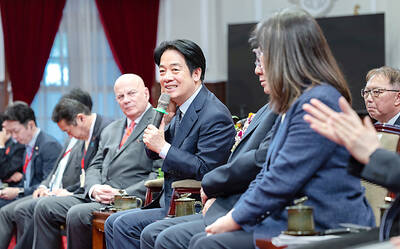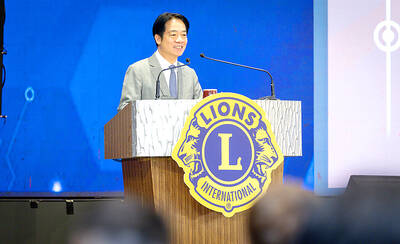Major national medical associations, including the Taiwan Public Health Association, have said they support a proposal by the National Health Insurance Administration (NHIA) to fund new cancer medicines through a liquor surcharge.
At the Sustainability Forum for Taiwan Multi-support Cancer Drugs Fund on Tuesday, NHIA Director-General Shih Chung-liang (石崇良) proposed imposing alcohol health and welfare surcharges to fund President William Lai’s (賴清德) policy to raise NT$10 billion (US$307.93 million) within three years for cancer drugs, with the aim of reducing cancer deaths by one-third by 2030.
As many as 880,000 people had cancer last year, with treatment expenses totaling NT$139.9 billion and cancer drug expenses of NT$39.4 billion, Shih said.

Photo: Chen Kuan-pei, Taipei Times
The average increase in cancer medicine expenditure from 2014 to last year was 9.3 percent, he said.
The fund is needed as the growth rate of cancer drug expenditure has far surpassed the National Health Insurance’s (NHI) total budget, while the conditional listings under the budget would compete with other medical services, he said.
The cancer drugs fund is a special revenue fund, which would require financial sources separate from existing government income or national treasury appropriation in accordance with the Fiscal Discipline Act (財政紀律法).

Photo: Chu Pei-hsiung, Taipei Times
Civic groups, including the Taiwan Public Health Association, Formosa Association for the Surgery of Trauma, Taiwanese Society of Addiction, Taiwan Alcohol Prevention Association, Taiwan Alcohol Intolerance Education Society, Taiwanese Academy of Psychiatric Epidemiology, Taiwanese Society of Psychiatry, Taiwan Association of Clinical Psychology and Taiwan Against Drunk Driving, said in a recent joint statement that they support the proposal.
Empirical research has shown that imposing an alcohol tax or surcharge can reduce alcohol-related risks, with a more significant beneficial effect for disadvantaged groups, such as teenagers and people of lower socioeconomic status, compared with other demographic groups, the statement said.
The nation’s success in curbing tobacco use could be drawn on to establish the alcohol surcharge, which could also fund the control, intervention or treatment of alcohol abuse, prevention of drunk driving, or other research and policies, as many countries have been doing, it said.
Minister of Health and Welfare Chiu Tai-yuan (邱泰源) on Monday said the cancer drug fund would be used mainly on new cancer medicines, with nearly NT$2.43 billion allocated to conditional listings under the NHI’s budget for this year.
By 2026, the fund is expected to reach NT$10 billion, independent of the NHI’s budget and the fund for rare diseases, he said.
Additional reporting by CNA

Two US House of Representatives committees yesterday condemned China’s attempt to orchestrate a crash involving Vice President Hsiao Bi-khim’s (蕭美琴) car when she visited the Czech Republic last year as vice president-elect. Czech local media in March last year reported that a Chinese diplomat had run a red light while following Hsiao’s car from the airport, and Czech intelligence last week told local media that Chinese diplomats and agents had also planned to stage a demonstrative car collision. Hsiao on Saturday shared a Reuters news report on the incident through her account on social media platform X and wrote: “I

‘BUILDING PARTNERSHIPS’: The US military’s aim is to continue to make any potential Chinese invasion more difficult than it already is, US General Ronald Clark said The likelihood of China invading Taiwan without contest is “very, very small” because the Taiwan Strait is under constant surveillance by multiple countries, a US general has said. General Ronald Clark, commanding officer of US Army Pacific (USARPAC), the US Army’s largest service component command, made the remarks during a dialogue hosted on Friday by Washington-based think tank the Center for Strategic and International Studies. Asked by the event host what the Chinese military has learned from its US counterpart over the years, Clark said that the first lesson is that the skill and will of US service members are “unmatched.” The second

STANDING TOGETHER: Amid China’s increasingly aggressive activities, nations must join forces in detecting and dealing with incursions, a Taiwanese official said Two senior Philippine officials and one former official yesterday attended the Taiwan International Ocean Forum in Taipei, the first high-level visit since the Philippines in April lifted a ban on such travel to Taiwan. The Ocean Affairs Council hosted the two-day event at the National Taiwan University Hospital International Convention Center. Philippine Navy spokesman Rear Admiral Roy Vincent Trinidad, Coast Guard spokesman Grand Commodore Jay Tarriela and former Philippine Presidential Communications Office assistant secretary Michel del Rosario participated in the forum. More than 100 officials, experts and entrepreneurs from 15 nations participated in the forum, which included discussions on countering China’s hybrid warfare

MORE DEMOCRACY: The only solution to Taiwan’s current democratic issues involves more democracy, including Constitutional Court rulings and citizens exercising their civil rights , Lai said The People’s Republic of China (PRC) is not the “motherland” of the Republic of China (ROC) and has never owned Taiwan, President William Lai (賴清德) said yesterday. The speech was the third in a series of 10 that Lai is scheduled to deliver across Taiwan. Taiwan is facing external threats from China, Lai said at a Lions Clubs International banquet in Hsinchu. For example, on June 21 the army detected 12 Chinese aircraft, eight of which entered Taiwanese waters, as well as six Chinese warships that remained in the waters around Taiwan, he said. Beyond military and political intimidation, Taiwan